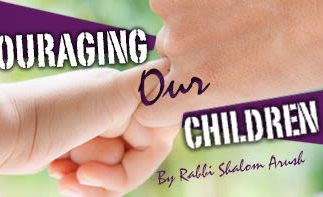
The Winning Formula
Contrary to what many people think, parental support and encouragement won't make the child into an emotional cripple - support, yes; an overprotective bear hug, no...

Small children have delicate souls and therefore need emotional support. They have not yet developed the “emotional muscle” to deal with major difficulties. Sometimes, it is not enough for the parents to encourage and strengthen the child, telling him that he can deal with the situation and so forth. Occasionally, a child simply needs to lean on his parents, enlisting their help in shouldering the difficulty. Parental support during a child’s difficult times gives him strength that will last throughout his life. Contrary to what many people think, parental support and encouragement won’t make the child into an emotional cripple. On the contrary, parental support – not an overprotective bear hug and constant intervention – gives children self-confidence and a good feeling.
When one of my sons was of elementary-school age, he was experiencing difficulties. Praise and encouragement didn’t help him. He needed someone to lean on, so that is what we provided for him. I calmed him down and told him that I would pray for him and speak to the relevant people about his needs. Thank G-d, he got over this difficult period and grew up with solid self-esteem.
In general, parents’ approach to children should be like any approach to another person experiencing ups and downs. Children need encouragement like anyone else. Parents must focus on their child’s strengths  and emphasize his successes. This encouragement fills the child with self-esteem and confidence, paving the way for future success. Parents must also give their child concrete help where needed.
and emphasize his successes. This encouragement fills the child with self-esteem and confidence, paving the way for future success. Parents must also give their child concrete help where needed.
Don’t wait for a child to fail before you encourage him. Instead, parents should teach their children that failure is part of life. The first thing a varsity wrestler or gymnast learns is how to fall. We must likewise teach our children how to strengthen and encourage themselves during and following a “fall” in life, for everyone falls from time to time. Like the veteran equestrians say, success is measured by how quickly you get back on the horse after a fall.
Before parents can teach how to deal with life’s failures to their children, parents must stop castigating themselves. Generally, parents regard their children’s failures and shortcomings as their own. Their child’s problem undermines their own self-esteem. They consider themselves failures as parents, blaming themselves for their child’s problem.
True, a parent’s conduct greatly influences a child. But in many cases, one must analyze a situation differently, with no self-blame. After all, children have myriad problems even if the parents are the best mentors in the world. Further, everybody is human and parents also make mistakes. There is no call for panic. Instead, we must try to rectify what we can, and Hashem will surely help. The child is also a soul that needs to be perfected. Sometimes, that soul perfection is by way of the parent.
First, the parent must cast aside any thoughts of guilt and self-blame; only then will he be able to educate his children with serenity.
Here’s the vicious cycle: The parent blames himself, becomes tense and nervous, and consequently makes mistakes with his children. He then castigates himself for his mistakes, becoming even more paranoid and sensitive. He takes every small mistake of his child personally, reacting irrationally or even hysterically. This causes emotional harm to the child. Then the parent castigates himself for his rash reaction, and the wheel goes round and round…
Dear parents, you’re not a chinchilla on a wheel! Stop that cycle. Do your best to accept your mistakes with faith, for once you’ve had a setback, that’s exactly what Hashem wants at this time. Accept your slip-ups with faith and continue with joy, while praying and working on yourself the best way you can. If you do, you’ll see the fruits of your efforts. You’ll succeed in teaching your children calmly. Your self-esteem will grow and you’ll be less sensitive. Stop taking your children’s shortcomings personally. Blame is not the name of the game. Concentrate on raising your children with serenity, praise and encouragement.
Here’s the winning formula: Accept the fact that you are human, occasionally making mistakes and suffering a fall. That’s not the end of the world, but an integral part of life. Teach your children the same. The trick is to be happy no matter what by focusing on our good points even when life’s difficulties become virtually unbearable. That way, your children will learn to use the same healthy approach to life. They’ll understand that failure is an intrinsic part of the path to truth.
Our Sages teach that a person does not truly understand what he has learned in Jewish law if he has not previously erred in the area of his learning. In other words, it is impossible to truly understand Jewish law or Torah – without failures. A parent must be strong and courageous and walk in the path of truth. He must rejoice in every tiny morsel of good that he finds in himself, and certainly over every success. In this way, he will build himself, his family and his entire surroundings.












Tell us what you think!
Thank you for your comment!
It will be published after approval by the Editor.